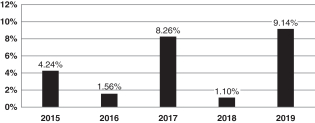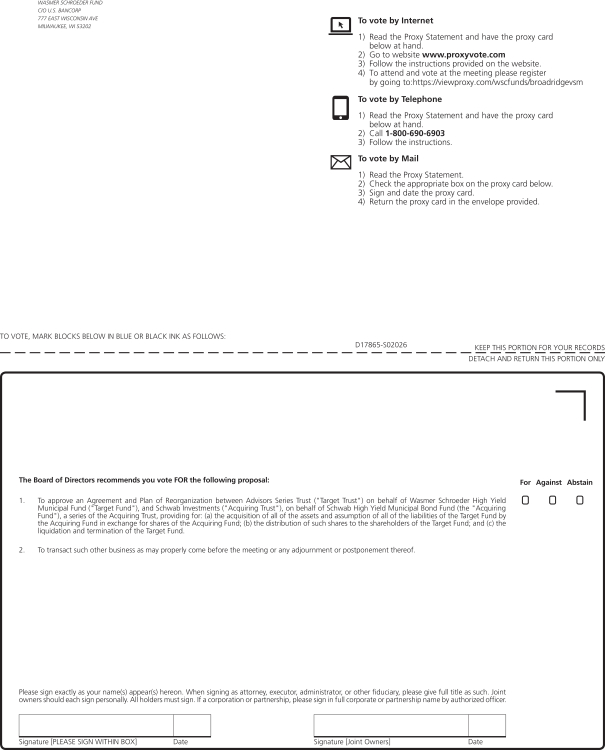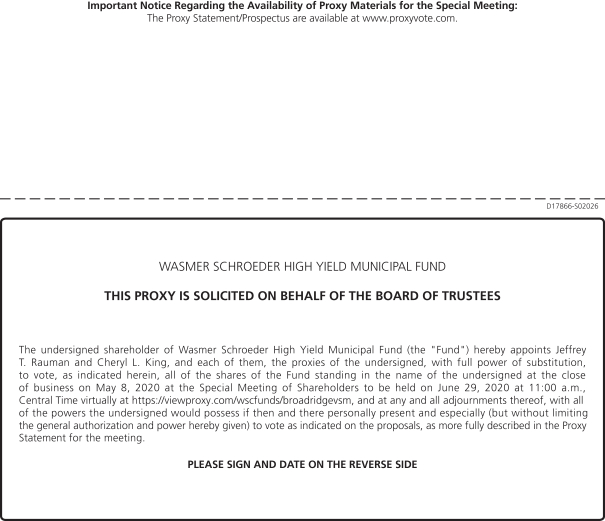have coupon or interest payments that may increase or decrease to predetermined rates at future dates. Some step-coupon securities are issued with no coupon payments at all during an initial period, and only become interest-bearing at a future date; these securities are sold at a deep discount to their face value. Pay-in-kind securities pay interest through the issuance of additional securities. Because such securities do not pay current cash income, the price of these securities can be volatile when interest rates fluctuate. High-yield securities structured as zero-coupon bonds or pay-in-kind securities tend to be especially volatile as they are especially sensitive to downward pricing pressures from rising interest rates and may require a fund to pay out imputed income without receiving the actual cash delivery. Thus, these types of high yield investments increase the chance that the fund may lose money. While these securities do not pay current cash income, federal income tax law requires the holders of zero-coupon, step-coupon, and pay-in-kind securities to include in income each year the portion of the original issue discount (or deemed discount) and other non-cash income on such securities accruing that year. In order to continue to qualify as a “regulated investment company” or “RIC” under the Internal Revenue Code of 1986, as amended (Internal Revenue Code) and avoid a certain excise tax, a fund may be required to distribute a portion of such discount and income and may be required to dispose of other portfolio securities, which may occur in periods of adverse market prices, in order to generate cash to meet these distribution requirements.
Market Disruptions Risk. The fund is subject to investment and operational risks associated with financial, economic and other global market developments and disruptions, including those arising from war, terrorism, market manipulation, government interventions, defaults and shutdowns, political changes or diplomatic developments, public health emergencies (such as the spread of infectious diseases, epidemics and pandemics) and natural/environmental disasters, which can all negatively impact the securities markets and cause a fund to lose value. These events can also impair the technology and other operational systems upon which the fund’s service providers, including CSIM as the fund’s investment adviser, rely, and could otherwise disrupt the fund’s service providers’ ability to fulfill their obligations to the fund.
The recent spread of an infectious respiratory illness caused by a novel strain of coronavirus (known as COVID-19) has caused volatility, severe market dislocations and liquidity constraints in many markets, and may adversely affect the fund’s investments and operations. The outbreak was first detected in December 2019 and subsequently spread globally. The transmission of COVID-19 and efforts to contain its spread have resulted in travel restrictions and disruptions, closed international borders, enhanced health screenings at ports of entry and elsewhere, disruption of and delays in healthcare service preparation and delivery, quarantines, event and service cancellations or interruptions, disruptions to business operations (including staff reductions), supply chains and consumer activity, as well as general concern and uncertainty that has negatively affected the global economic environment. These disruptions have led to instability in the market place, including losses and overall volatility. The impact of COVID-19, and other infectious illness outbreaks, epidemics or pandemics that may arise in the future, could adversely affect the economies of many nations or the entire global economy, the financial performance of individual issuers, borrowers and sectors and the health of the markets generally in potentially significant and unforeseen ways.
The foregoing could lead to a significant economic downturn or recession, increased market volatility, a greater number of market closures, low or negative interest rates, higher default rates and adverse effects on the values and liquidity of securities or other assets. Such impacts, which may vary across asset classes, may adversely affect the performance of the fund. In certain cases, an exchange or market may close or issue trading halts on specific securities or even the entire market, which may result in the fund being, among other things, unable to buy or sell certain securities or financial instruments or to accurately price its investments.
To satisfy any shareholder redemption requests during periods of extreme volatility, it is more likely the fund may be required to dispose of portfolio investments at inopportune times or prices.
INVESTMENT LIMITATIONS AND RESTRICTIONS
The following investment limitations are fundamental investment policies and restrictions and may be changed only by vote of a majority of the fund’s outstanding voting shares.
Schwab High Yield Municipal Bond Fund may not:
| (1) | The Acquiring Fund may not purchase securities of an issuer, except as consistent with the maintenance of its status as an open-end diversified company under the 1940 Act, the rules or regulations thereunder or any exemption therefrom, as such statute, rules or regulations may be amended or interpreted from time to time. |
| (2) | Concentrate investments in a particular industry or group of industries, as concentration is defined under the 1940 Act, the rules or regulations thereunder or any exemption therefrom, as such statute, rules or regulations may be amended or interpreted from time to time. |
| (3) | Purchase or sell commodities or real estate, except to the extent permitted under the 1940 Act, the rules or regulations thereunder or any exemption therefrom, as such statute, rules or regulations may be amended or interpreted from time to time. |
| (4) | Purchase securities of other investment companies, except as permitted by the 1940 Act. |
| (5) | Make loans to other persons, except to the extent permitted under the 1940 Act, the rules or regulations thereunder or any exemption therefrom, as such statute, rules or regulations may be amended or interpreted from time to time. |
| (6) | Borrow money, except to the extent permitted under the 1940 Act, the rules or regulations thereunder or any exemption therefrom, as such statute, rules or regulations may be amended or interpreted from time to time. |
| (7) | Issue senior securities, except to the extent permitted under the 1940 Act, the rules or regulations thereunder or any exemption therefrom, as such statute, rules or regulations may be amended or interpreted from time to time. |
| (8) | Underwrite securities issued by other persons, except to the extent permitted under the 1940 Act, the rules or regulations thereunder or any exemption therefrom, as such statute, rules or regulations may be amended or interpreted from time to time. |
The following descriptions of the 1940 Act may assist investors in understanding the above policies and restrictions.
Diversification. Under the 1940 Act, a diversified investment management company, as to 75% of its total assets, may not purchase securities of any issuer (other than U.S. government securities or securities of other investment companies) if, as a result, more than 5% of its total assets would be invested in the securities of such issuer, or more than 10% of the issuer’s outstanding voting securities would be held by the fund.
Concentration. The SEC has presently defined concentration as investing 25% or more of an investment company’s net assets in an industry or group of industries, with certain exceptions.
Borrowing. The 1940 Act presently allows a fund to borrow from any bank (including pledging, mortgaging or hypothecating assets) in an amount up to 33 1/3% of its total assets (not including temporary borrowings not in excess of 5% of its total assets).
Lending. Under the 1940 Act, a fund may only make loans if expressly permitted by its investment policies. The fund’s non-fundamental investment policy on lending is set forth below.
Underwriting. Under the 1940 Act, underwriting securities involves a fund purchasing securities directly from an issuer for the purpose of selling (distributing) them or participating in any such activity either directly or indirectly. Under the 1940 Act, a diversified fund may not make any commitment as underwriter, if immediately thereafter the amount of its outstanding underwriting commitments, plus the value of its investments in securities of issuers (other than investment companies) of which it owns more than 10% of the outstanding voting securities, exceeds 25% of the value of its total assets. The foregoing restriction does not apply to non-diversified funds.
Real Estate. The 1940 Act does not directly restrict the fund’s ability to invest in real estate, but does require that every fund have a fundamental investment policy governing such investments. The fund has adopted a fundamental policy that would permit direct investment in real estate. However, the fund has a non-fundamental investment limitation that prohibits it from investing directly in real estate. This non-fundamental policy may be changed only by vote of the fund’s Board.
17


